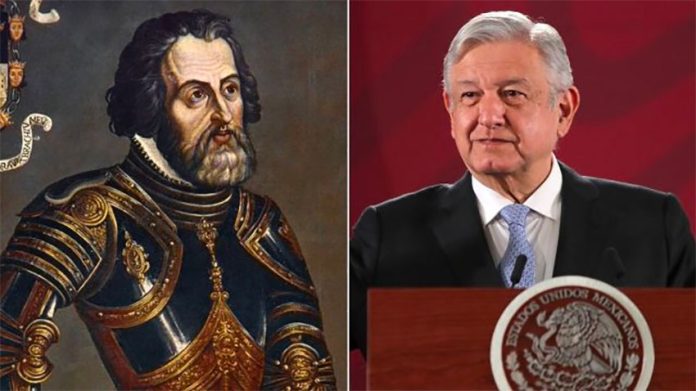When Hernán Cortés finally conquered the Aztecs on August 13, 1521, it should have been a glorious triumph for the Spanish invaders, who had suffered an ignominious rout the previous year.
Tenochtitlán, the monumental Mexican capital constructed on a lake, which had so awed the conquistadors when they first sighted it in 1519, had been starved into submission during a weeks-long siege, and Cuauhtémoc, the Aztec emperor, had at last surrendered.
Yet the mood, according to an enlightening new book on the Spanish Conquest of the Americas by Fernando Cervantes, a Mexican historian at the University of Bristol, “was not even remotely celebratory … Although a great victory had been won, the price was disproportionately high.”
The extraordinary half-century following Christopher Columbus’s discovery, in 1492, of what he maintained to his dying day was in fact Asia, fueled guilt as well as greed. The conquistadors’ callous and extreme cruelty plagued the Spanish crown even as it relied on a stream of New World gold to fund its imperial ambitions in a fast-changing Europe.
Cervantes details the adventurers’ venality and brutality as they pushed through the Caribbean to Mexico, Central America, Peru, Ecuador, Colombia and what is now the southern U.S.
But while Conquistadores unflinchingly narrates the excesses of Cortés and others, including Francisco Pizarro, who conquered Peru, Cervantes argues for a “badly needed re-evaluation [that] should also allow us to see through the persistent condemnations of the legacy of the conquistadors as directly responsible for the ills that afflict modern Latin America.”
That view is unlikely to go down well with Andrés Manuel López Obrador. The president maintains that the deeply ingrained corruption, which he is on a crusade to eradicate, all stemmed from Cortés, whose fraudulent activities included siphoning off a third of emperor Moctezuma’s gold for himself.
López Obrador, a history buff who lives in the National Palace that was originally built as Cortés’s second residence, has declared 2021 the “Year of the Independence and Greatness of Mexico” — marking the historical triple whammy of the 700th anniversary of the founding of Tenochtitlán, 500 years since its fall to the Spanish and 200 years since the culmination of Mexico’s lengthy independence struggle.
The government is euphemistically rebranding the anniversary of Cortés’s conquest the “memory of Tenochtitlán” — indeed, Zoé Robledo, the president of a commemoration commission, told a news conference last month “we have to give it a new meaning.”
Days before the October 12 Columbus Day anniversary, a statue of the explorer in Mexico City was taken down for maintenance and Mayor Claudia Sheinbaum called for a “collective reflection …. on this vision of the discovery of America that we all learn, as if America didn’t exist before Columbus arrived.”
Events in 2021 will include a revindication of indigenous rights and apologies for “atrocities committed in the colonial invasion,” said López Obrador, who has already made waves by demanding that Spain apologize for the events of 500 years ago.
In a letter to Pope Francis, delivered by his wife in an audience with the pontiff at the Vatican earlier this month, he also said the Catholic Church should join the Spanish monarchy and the Mexican state in issuing a public mea culpa to indigenous peoples “who suffered the most reproachful atrocities in sacking their goods and land and subjugating them, from the Conquest of 1521 until recent times.”
The president is a staunch advocate for indigenous Mexicans but polls show that most Mexicans see no need for a formal apology from Spain.
Cervantes is not insensitive to such concerns. He is a member of the advisory board of the Las Casas Institute, named after the Dominican friar Bartolomé de las Casas, who first traveled to the New World in 1502 and went on to chronicle Spanish abuses and become an ardent defender of indigenous rights.
In his book, Cervantes puts the conquistadors in the context both of the medieval religious culture that shaped their beliefs and the medieval legal tradition that helped Cortés, an experienced notary, erect “a convincing veneer of legality” to justify his actions in Mexico to the Spanish crown.
Conquistadores taps into the same pre-anniversary interest in the Conquest as Hernán, an Amazon Prime series on the life of Cortés. Cervantes details the Spanish adventurers’ venality and brutality as they pushed through the Caribbean to Mexico, Central America, Peru, Ecuador, Colombia and what is now the southern U.S.
Their “disordered avarice” and chaotic corruption repeatedly landed them in legal hot water but, as Cervantes puts it, “this was a world that saw no inherent contradiction in the attempt to establish forms of governance that were simultaneously high-minded and shamelessly lucrative.”
His conclusion that the roots of Latin America’s enduring social ills lie with 19th-century liberal reforms rather than with the Conquest is an intriguing argument slipped into the penultimate page, and one that he could have developed further.
But, for a vivid portrayal of a clash of very different cultures, each equally astonishing to the other, and a group of men who “whatever their myriad faults and crimes …succeeded more or less through their own agency, in fundamentally transforming Spanish and European conceptions of the world in barely half a century,” Conquistadores makes for fascinating reading.
Jude Webber is the Financial Times’ Mexico and Central America correspondent.
© 2020 The Financial Times Ltd. All rights reserved. Please do not copy and paste FT articles and redistribute by email or post to the web.
